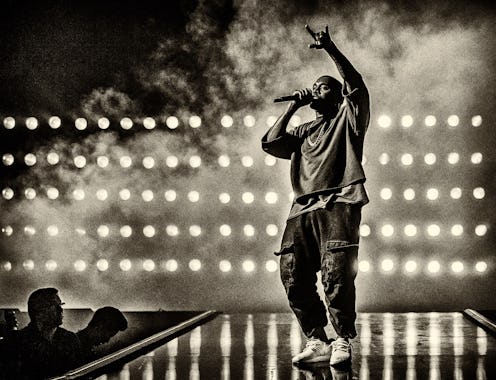Entertainment
Is 'The Life Of Pablo' Feminist?
Following the live stream of his album The Life of Pablo Thursday, the hype for Kanye West's new music has reached an all time high. Some of us took time out of our work schedules to watch the Madison Square Garden stream on TIDAL. Some of us have incessantly been googling when/where/how we can get our hands on the thing. But all of us are certainly nodding our heads to the beats left behind in our brains. And if we can remember any of the lyrics, chances are we're humming those too. Even the ones we might feel like go against our particular ideologies — like, say, feminism. And with this in mind, it's got me thinking about how should I, as a feminist, feel about Kanye West's The Life Of Pablo ?
Would I call Kanye West's music feminist? No. But I also wouldn't say this means I can't enjoy his music. It's much more complex than that — much more Kanye. And The Life of Pablo's no different. It's confusingly contradictory at times, with songs that reference Ye's daughter ("Ultra Light Beams") to others that aim to make it known how many women West's slept with — or at least theoretically, could sleep with ("Famous" and "High Lights"). There's a lot of hypocritical thoughts and emotions at play here, but I don't think that because we might not be ready to deal with this kind of unclear content and its intentions, we should write it all off as sexist.
It's true, gender progressivism within hip hop culture lacks substantial forward movement as a whole. But, West's music has always been nothing if not explorative of debunking hip hop culture in general, so to assume that his lyrics would never try to destabilize common stereotypes of gender in hip hop would be unfair to the artist.
There are lyrics within this album that not only speak to both genders, but that also understand feminism — even if that wasn't their original intention. For instance, in the first track on the album, "Ultra Light Beams," West says, "You persecute the weak/ Because it makes you feel so strong." It's a sentiment that challenges power dynamics, and potentially masculinity — and though not overtly feminist, it's a mantra that feminists can get behind.
On that same track, there's the theme of parenthood present. Presumably, the following lyric could be West speaking to the mother of his own child, but it could also be a general shout out to mothers everywhere (a thought that would be echoed by the earlier "Pray for the parents" line). He says, "Cause I know you’ll make everything alright/ And I know that you’ll take good care of your child." While it's not explicitly clear he's speaking to a woman here, the line feels like a refreshing respite from typical hip hop lyrics.
And then there are lyrics that don't seem to speak to feminism at all. In the song "Famous," West insinuates that he and "Taylor" (it seems like he means Swift) "might still have sex," because he "made that b*tch famous." Clearly, this lyric relies heavily on the sexist principle that a girl will sleep with you if you make her famous — and that whoever this "Taylor" is only has West, a man, to thank for her career. Not her own accomplishments. (Also, if he's talking about Swift — does he realize he interrupted her when she was winning a VMA?!) This is not OK — and neither is referring to his own wife, Kim Kardashian, as a "b*tch" in the following verse from "High Lights": "I bet me and Ray J would be friends/ If we ain't love the same b*tch/ Yeah, he might have hit it first/ Only problem is I'm rich."
Kardashian is not a sexual object — no woman is.
Clearly, The Life Of Pablo includes both feminist-leaning and not-so-feminist lyrics — to the point where calling it a feminist album would be false. But, as a feminist, this doesn't mean I can't still enjoy the album and the music West puts out — we all just have to be aware of the music we're consuming, and the potentially confused messages behind them.
Images: Giphy (2)
